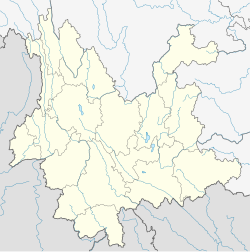Mengzi County
|
Mengzi 蒙自市 |
|
|---|---|
| County-level city | |
| Location in Yunnan | |
| Coordinates: 23°22′N 103°24′E / 23.367°N 103.400°ECoordinates: 23°22′N 103°24′E / 23.367°N 103.400°E | |
| Country | People's Republic of China |
| Province | Yunnan |
| Autonomous prefecture | Honghe |
| Area | |
| • Total | 2,228 km2 (860 sq mi) |
| Elevation | 1,310 m (4,300 ft) |
| Population | |
| • Total | 330,000 |
| • Density | 150/km2 (380/sq mi) |
| Time zone | China Standard (UTC+8) |
| Postal code | 661100 |
| Area code(s) | 0873 |
| Website | http://www.mzxzfw.gov.cn/ |
Mengzi (Chinese: 蒙自; pinyin: Měngzì; former French romanization: Mongtseu; postal: Mengtsz, also Mengtzu) is a city in the southeast of Yunnan province, People's Republic of China. Administratively, it is a county-level city and the seat of the Honghe Hani and Yi Autonomous Prefecture, located about 175 kilometres (109 mi) south-southeast of the provincial capital of Kunming. It is situated in the centre of a fertile valley basin on a plateau 1,000 metres (3,300 ft) above sea level. Mengzi was formerly Mengzi County (蒙自县) until October 2010, when it was upgraded to a county-level city.
The municipal seat is in Wenlan Town.
Located within 30 arc minutes south of the Tropic of Cancer, Mengzi, as with much of southern Yunnan, has a warm humid subtropical climate (Köppen Cwa), with muddled distinction between the seasons and daytime temperatures remaining warm year-round. Highs peak in May before the core of the rainy season and reach a minimum in December; however, the warmest and coolest months are June and December, respectively at 23.2 °C (73.8 °F) and 12.3 °C (54.1 °F); the annual mean is 18.65 °C (65.6 °F). June thru September accounts for over 60% of the annual rainfall of 859 mm (33.8 in) and during this time, some rainfall occurs on a majority of days, resulting in a marked reduction in sunshine. With monthly percent possible sunshine ranging from 34% in June and July to 64% in February, the city receives 2,161 hours of bright sunshine annually.
The Mengzi region is well known for a dish called guoqiao mixian ("Over the Bridge Rice Noodle"), made with long rice-flour noodles.
In 2012 it became apparent that several sets of fossil hominins from Maludong near Mengzi City (some of them already in museum collections) might potentially belong to a new species of homo sapiens although only 11-14K years old. These are provisionally known as the Red Deer Cave people.
...
Wikipedia

